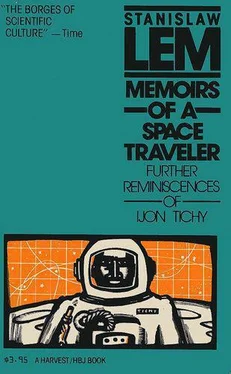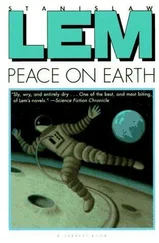“Follow me,” he said without any preliminaries. Through a long, dimly lit corridor in which machines, barrels, and dusty white bags of cement were stored, he led me to a large steel door. Above it shone a bright lamp. He took a key from his coat pocket, opened the door, and went in ahead. I followed him. We went up a flight of winding iron stairs. Before us opened a large factory hall with a glass ceiling; several naked light bulbs did not so much illuminate the hall as reveal its size. It was dim and deserted. The wind roared against the roof, and the rain that had begun to fall as I neared Corcoran’s home lashed the dark, dirty windowpanes. Here and there, water trickled through holes in the broken glass. Corcoran, seemingly unaware of this, walked ahead, the tin gallery rumbling under his footsteps. Again, a locked steel door. Behind it a corridor where tools covered with a thick layer of dust lay scattered along the walls, as though abandoned in flight. The corridor turned, went by tangled conveyor belts that resembled desiccated snakes. Our journey, which gave me an idea of the immensity of the building, continued. Once or twice Corcoran, in pitch-dark places, warned me to watch out for a step or to duck. He stopped at the last of the steel doors, which was thickly studded with rivets and obviously fireproof, and opened it. I noticed that, unlike the other doors, it did not creak; perhaps its hinges were oiled. We entered a high, bare hall. Corcoran stopped in the center of it, where the concrete of the floor was somewhat lighter in color, as though on this spot there once had stood a machine, from which only projecting stubs of beams remained. Thick vertical bars ran along the walls, reminiscent of a cage. I recalled the question about ghosts… Strong shelves with supports were fastened to the bars, and a number of cast-iron boxes rested on these. You know the treasure chests that pirates bury, in storybooks? They were exactly that kind of box, with bulging lids. On each was a cellophane-covered white card, like the charts one finds on hospital beds. A dusty light bulb shone from the ceiling, but was so dim I couldn’t read a single word of what was written on those cards. The boxes stood in two rows, with one box higher and apart from the rest. I counted them; there were twelve, fourteen, I don’t remember exactly.
“Tichy.” Corcoran turned to me, his hands in his coat pockets. “Listen carefully for a moment and tell me what you hear. Go on!”
There was an unusual impatience about the man — you could not help being struck by it. Whenever he spoke, he immediately wanted to get to the point, and to be finished, as if every moment spent with someone else was wasted.
I closed my eyes and stood motionless for a while, more out of courtesy than curiosity, having noticed no sound as I came in. I heard nothing. There may have been a faint hum, as of electric current in a coil, something like that, but I assure you, it was so low that the buzz of a dying fly could have been heard over it.
“Well, what do you hear?” he asked.
“Hardly anything,” I confessed. “A hum… but it may be only the blood in my ears…”
“It isn’t… Tichy, listen carefully; I don’t like to repeat myself, and I say this only because you don’t know me. I’m not the boor or cad people take me for, but it’s hard to put up with idiots for whom one must repeat the same thing ten times over. I hope you aren’t one of them.”
“We’ll see,” I replied. “Go on, Professor…”
He nodded and, pointing to the rows of iron boxes, said:
“Are you familiar with electronic brains?”
“Only as much as you need to know in navigation,” I replied. “I’m kind of weak in theory.”
“I figured as much. It doesn’t matter. Listen, Tichy. These boxes contain perfect brains. Do you know wherein lies their perfection?”
“No,” I admitted.
“Their perfection lies in the fact that they serve no purpose, are absolutely, totally useless — in short, they are Leibnizian monads, which I have brought into being and clad in matter…”
I waited, and he went on. His gray mustache fluttered in the semidarkness like a moth.
“Each box contains an electronic system that generates consciousness, as does our brain. The structure is different, the principle is the same. But there the similarity ends. Because our brains are plugged, so to speak, into the external world, by means of sensory receptors — the eyes, ears, nose, skin, and so on. However, I these" — he pointed to the boxes — “have their own external world, inside…”
“How is that possible?” I asked. Something began to dawn on me. I couldn’t quite make it out, but it made me shudder.
“It’s very simple. How do we know that we have such-and-such a body and not another, or such-and-such a face, that we are standing, that we hold a book, that flowers smell good? Because certain stimuli act upon our senses, and nerves relay messages to the brain. Imagine, Tichy, that I could stimulate your olfactory nerve in exactly the same way that a carnation does — what would you smell?”
“A carnation, of course,” I replied.
The professor, nodding as though glad that I was adequately intelligent, continued:
“And if I do the same with all your nerves, you will perceive not the external world but what I telegraph, through these nerves, to your brain. Is that clear?”
“Yes.”
“Now, then. These boxes have receptor organs that function analogously to our sight, smell, hearing, touch, and so on. And the wires from these receptors are connected like nerves, but not to the external world, as our nerves are; they are connected to the drum there in the corner. You noticed it?”
“No,” I said. Indeed, a drum, perhaps three meters in diameter, stood far in the back, like an upright millstone. I realized, after a while, that it was very slowly turning.
“That is their fate,” Professor Corcoran said calmly. “Their fate, their world, their existence — everything they can attain and experience. It has special tapes, recorded electrical stimuli that correspond to the one or two hundred billion phenomena a person may encounter in the most impression-packed life. If you raised the lid of the drum, you would see only shiny tapes covered with white zigzags, like mold on celluloid; but, Tichy, they are sultry southern nights, the murmur of waves, the forms of animal bodies, and the crackle of gunfire; funerals and drinking binges; the taste of apples and oranges, snowstorms on evenings spent with the family by the fireside, and the pandemonium aboard a sinking ship; the convulsions of illness, and mountain peaks, and graveyards, and the hallucinations of the delirious — Tichy, it contains the world!”
I remained silent. Corcoran, seizing my arm with an iron grip, said:
“These boxes, Tichy, are plugged into an artificial world. That one" — he pointed to the first box — “thinks it is a seventeen-year-old girl with green eyes, red hair, and the body of a Venus. She is the daughter of a statesman… in love with a young man whom she sees from her window almost every day… and who will be her ruin. The second, here, is a scientist. He is coming close to a general theory of the gravity that operates in his world — a world whose boundaries are the iron walls of the drum — and he will fight for his truth in a solitude intensified by impending blindness, because he will go blind, Tichy… And up there is a member of the priesthood who is going through the most difficult time of his life, for he has lost faith in the existence of his immortal soul… Next to him, behind the partition, we have… but it is impossible for me to tell you of all the beings I have created.”
“But I’d like to know — “
“Don’t interrupt!” snapped Corcoran. “I’m speaking! You still don’t understand. You probably think that various signals are set down in that drum, as on a phonograph record; that events are arranged like a melody, with all the notes, waiting only for a needle to bring them to life; that these boxes reproduce what are predetermined experiences. Wrong! Wrong!” He was yelling so loudly that the tin ceiling echoed. “That drum is to them what the world is to you! It never seems to you, does it, when you eat, sleep, get up, travel, and visit old madmen, that all that is a phonograph record whose touch you call the present!”
Читать дальше












